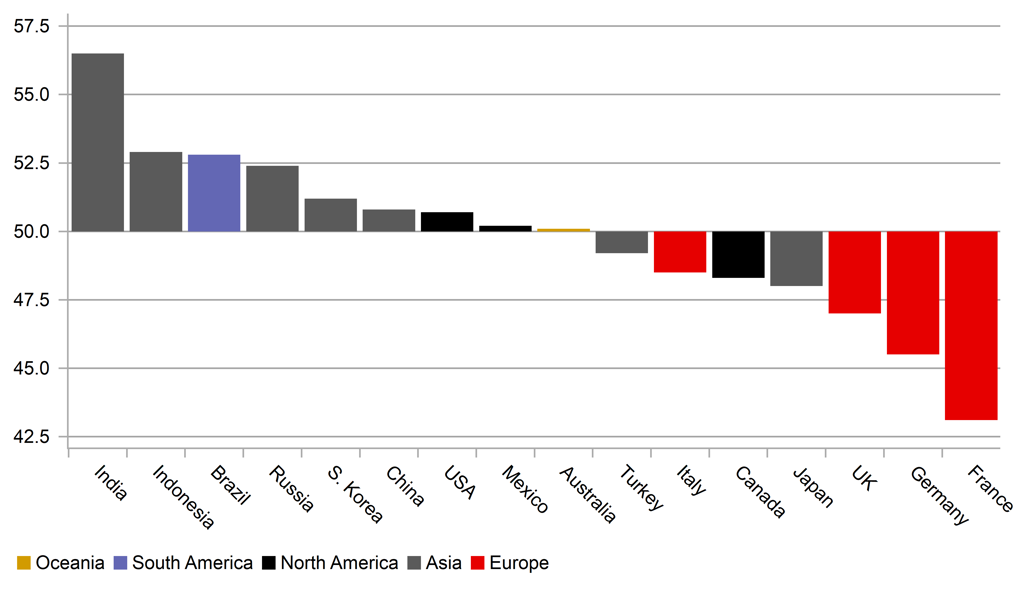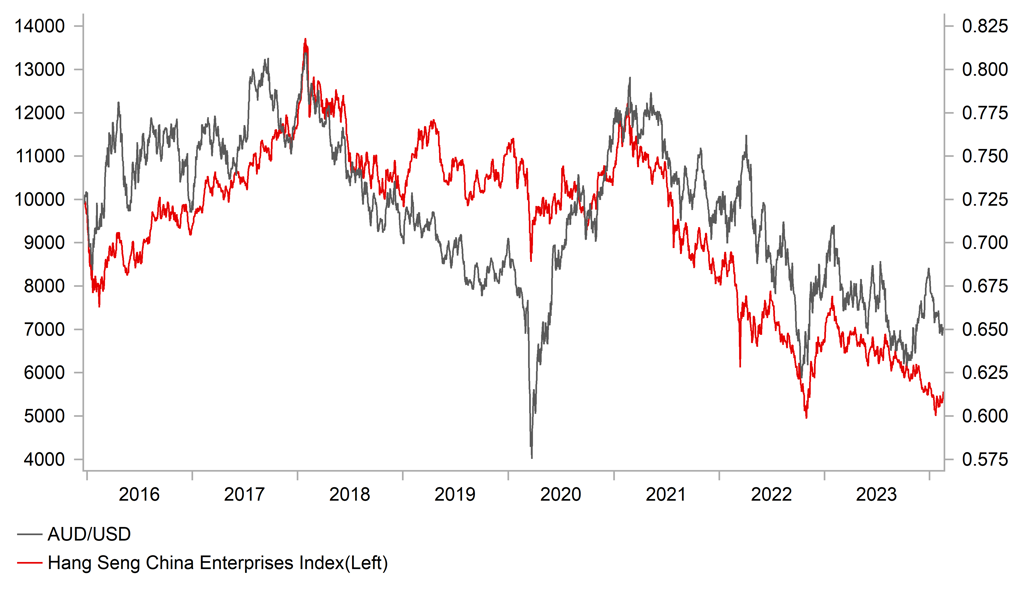Recessions bar the US and a weaker US dollar
USD: Weak global data fails to extend dollar strength
The US dollar is stronger versus all G10 currencies this week although that strength partially reversed yesterday on a day when technical recessions were confirmed in Japan and the UK and on the previous day, GDP data from the euro-zone confirmed there was no growth in the second half of last year. Is this an indication that the rebound of the US dollar has reached exhaustion point? From the intra-day low on the second last trading day of last year to the intra-day high this week, the dollar (DXY) advanced 4.4% but the correction weaker yesterday was notable. The weak retail sales data from the US was the catalyst although the drop in front-end yields in the US completely reversed in the hours following the retail sales release the 2yr note yield is now higher. As we have stated here this week, the dollar retracement of the drop in Nov/Dec has been much greater than the retracement in US yields and that might mean there are limits to further dollar strength over the near-term. Still, in a backdrop of recessionary (or near recessionary) conditions in Europe and Japan and a real estate crisis in China, we would continue to see upside risks for the dollar.
The rebound of all G10 currencies yesterday certainly points to US dollar strength exhaustion but we would also argue the data flow hasn’t really altered the outlook for monetary policy. It remains largely synchronised with expectations pushed back everywhere and the cumulative amount of cuts reduced everywhere.
Recession in the UK doesn’t alter that. BoE Governor Bailey had already spoken of the improved outlook and that it is how the economy evolves going forward that will determine BoE policy decisions. In other words, weak GDP doesn’t bring forward the prospect of rate cuts given the survey data amongst households and businesses points to a pick-up in growth. The same could be argued for the euro-zone and in that regard the advance PMIs next Thursday could be crucial for rates and FX and any renewed weakness in advance PMIs in Europe could see the dollar advance more notably.
For Japan we would argue that the -0.4% Q/Q SAAR reading in Q4 after a -3.3% print in Q3 merely underlines the negative consequences of Japan’s inflation shock, which has unfolded a little behind the US and Europe and hence is still impacting. Real household spending fell 2.5% in December YoY and weak consumption has been a big drag on growth. If anything, lifting rates out of negative territory could help restore some confidence especially given the BoJ has been in recent months highlighting the benefits of removing negative rates for households, corporations and financial institutions. We don’t see the GDP data yesterday as altering the prospect of a rate hike in March or April by much. In addition, the weakness of consumption may also encourage intervention in USD/JPY – consistent with the comments from Finance Minister Suzuki and Vice Finance Minister Kanda this week.
MANUFACTURING PMIS IN EUROPE HAVE BIGGEST SCOPE FOR REBOUND

Source: Bloomberg, Macrobond & MUFG GMR
AUD: Rebound despite weaker jobs data
The broad depreciation of the US dollar yesterday helped lift AUD/USD even after jobs data from Australia was weaker than expected. From the low in late October to the high in December, AUD/USD has now retraced over 50% of that move reflecting the wider US dollar strength and the continued worsening of investor sentiment in China. The economy gained just 500 jobs in January which helped lift the unemployment rate to 4.1%, the highest since January 2022. However, there was also increased labour supply which should help to dampen wage pressures.
RBA Governor Bullock did speak yesterday just before the jobs data was released and expressed concern over services inflation persistence which was viewed as slowing the return of inflation to the target. Front-end yields dropped sharply in response to the weaker jobs data but have partially reversed that move today and we maintain that the RBA will be in no rush to commence monetary easing given it was more cautious in tightening monetary policy and the economy is expected to gradually accelerate through 2024 (Bloomberg consensus).
Over the short-term, direction could be influenced by the reopening of China next week after the end of the Lunar New Year holiday. Sentiment in China remains dire and there is continued expectations that further policy easing steps will be taken. A rate cut over this weekend is one potential scenario in order to help sentiment at the start of trading after the holiday, which could help AUD sentiment at the start of next week. Some good news is also emerging in relation to holiday activities that may indicate a pick-up in consumer sentiment. More than 61mn rail trips were made in the first six days of the new year holiday, which according to Bloomberg News is the highest in the last five years. More positive data could help provide a positive start next week in China. USD/CNY could open a touch higher given DXY this week is about 0.3% stronger although USD/CNH is close to the levels of last Friday, the last day of onshore CNY trading.
NEGATIVE CHINA SENTIMENT A DRAG ON AUD

Source: Macrobond & Bloomberg
KEY RELEASES AND EVENTS
|
Country |
GMT |
Indicator/Event |
Period |
Consensus |
Previous |
Mkt Moving |
|
EC |
08:45 |
ECB's Schnabel Speaks |
-- |
-- |
-- |
!! |
|
CA |
11:00 |
Leading Index (MoM) |
Jan |
-- |
0.05% |
! |
|
US |
13:30 |
Building Permits |
Jan |
1.509M |
1.493M |
!! |
|
US |
13:30 |
Building Permits (MoM) |
Jan |
-- |
1.8% |
! |
|
US |
13:30 |
Housing Starts |
Jan |
1.450M |
1.460M |
!! |
|
US |
13:30 |
Housing Starts (MoM) |
Jan |
-- |
-4.3% |
!! |
|
US |
13:30 |
Core PPI (YoY) |
Jan |
1.6% |
1.8% |
! |
|
US |
13:30 |
Core PPI (MoM) |
Jan |
0.1% |
0.0% |
!! |
|
US |
13:30 |
PPI ex. Food/Energy/Transport (MoM) |
Jan |
-- |
0.2% |
! |
|
US |
13:30 |
PPI (YoY) |
Jan |
0.6% |
1.0% |
! |
|
US |
13:30 |
PPI (MoM) |
Jan |
0.1% |
-0.1% |
!!! |
|
US |
13:30 |
PPI ex. Food/Energy/Transport (YoY) |
Jan |
-- |
2.5% |
! |
|
CA |
13:30 |
Foreign Securities Purchases |
Dec |
-6.45B |
11.43B |
!! |
|
CA |
13:30 |
Foreign Securities Purchases by Canadians |
Dec |
-- |
12.53B |
! |
|
CA |
13:30 |
Wholesale Sales (MoM) |
Dec |
0.7% |
0.9% |
!! |
|
US |
14:10 |
Fed Vice Chair for Supervision Barr Speaks |
-- |
-- |
-- |
! |
|
US |
15:00 |
Michigan 1-Year Inflation Expectations |
Feb |
-- |
2.9% |
!! |
|
US |
15:00 |
Michigan 5-Year Inflation Expectations |
Feb |
-- |
2.9% |
!! |
|
US |
15:00 |
Michigan Current Conditions |
Feb |
82.0 |
81.9 |
! |
|
US |
17:10 |
FOMC Member Daly Speaks |
-- |
-- |
-- |
!! |
|
UK |
19:40 |
BoE MPC Member Pill Speaks |
-- |
-- |
-- |
!!! |
Source: Bloomberg


